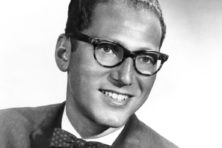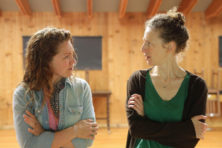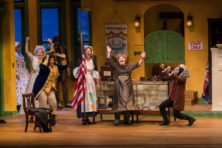TAP’s ‘Tomfoolery’: Witty, Wicked, Thought-Provoking
- Share
- Tweet
- Pin
- Share
For better or worse, I usually understand the (ahem) “older” cultural references when I’m among my colleagues, but when I attended Third Avenue Playhouse’s (TAP) musical revue Tomfoolery, I was, unusually, partaking of some references that were before my time. Audience members were asked at the beginning to raise a hand if they were not familiar with the work of Tom Lehrer, and mine was one of only two or three in the air. That fact may prove informative as you read on.
If you would have joined me in raising your hand about the work of the cynical and irreverent Lehrer, here’s a brief light in the dark. He entered Harvard as a 15-year-old undergrad and an 18-year-old grad student, and it was during his college years that he began to write his witty and wicked songs and perform them on the piano. Friends encouraged him to record an album, which became an unexpected smash hit and laid the groundwork for making millions of fans laugh – perhaps a little uncomfortably – during the 1950s and ’60s courtesy of his concerts, TV appearances and series of recordings. Lehrer didn’t finish his Ph.D., but he did spend nearly 40 years teaching math at MIT and UC-Santa Cruz. (It wasn’t all about the songs.)
He gave up songwriting and performing in public during the 1970s because, the story goes, he felt that Henry Kissinger’s receipt of the 1973 Nobel Peace Prize made satire obsolete. But Lehrer’s music didn’t stop there. Cameron Mackintosh and Robin Ray gathered 28 of his hits and added narrative to link them to produce Tomfoolery, which premiered in London in 1980 and ran Off Broadway in 1981. Lehrer, now age 91, lives in Santa Cruz, California.
His satirical songs and comedic banter have a most definite edge as their sarcastic lyrics lampoon the military, the gleeful poisoning of pigeons, the Boy Scouts, bigotry, racism, pollution, college traditions, plagiarism, dysfunctional relationships in several flavors, A-bomb annihilation, STDs, war, hunting, pornography, math, murder, dismemberment, masochism, drug dealing, bull fighting, the Catholic church and even being nice. Lehrer said, “If after hearing my songs, just one human being is inspired to say something nasty to a friend or perhaps to strike a loved one, it will all have been worth the while.”
See? Pretty dark and twisted.
Some of the songs seemed dated to me because they are, after all, a reflection of Lehrer’s times – until I realized that as a society, we are, most unfortunately, still dealing with the issues they raise. In some cases, we’ve made progress – even a lot of progress – but in other cases, we’ve made progress and then backslid. And there’s an element of prophecy as well: Some of the issues that Lehrer satirized have revived, revised and revealed themselves in scary and sickening ways that he probably thought he was exaggerating but, in fact, was understating.
I’ve been (rightly) accused of overanalysis, but I kept feeling a nagging conflict of emotions based in the question, Is it OK to laugh at disturbing topics? And can/does/should that answer change when they’re presented in a startlingly (and refreshingly) candid, but light-hearted and funny way? Finally, am I viewing all of this through a politically correct lens that was not in place at the time Lehrer penned and played these tunes and that has since taken quite a thrashing?
While pondering all of this, I reasoned that laughter is good for the soul, right? And being a little wicked is – let’s face it – always fun. I further reasoned that being forced to consider very uncomfortable truths about our shortcomings, anxieties, vices and stupidities is good for the mind, the conscience, the character.
It’s just that I didn’t expect to find an angel and a devil sitting on my shoulders – or experience these thoughts swirling around all in the same evening – during a really wonderful, impressive song-and-dance revue. This, I suppose, is the genius and value of satire: It exposes society’s seedy underbelly and the truths we would rather not face, but it presents them in such an endearing, enchanting way that we quite enjoy the ride.
And Lehrer’s tunes are enchanting, lilting, fun, erudite, upbeat and so clever – all the better to sneak up on you, my dear. (“Irreverence is easy – what’s hard is wit,” Lehrer said, but he certainly got the wit right.)
The four very talented actors in Tomfoolery – directed by Robert Boles – did an outstanding job of playing a piano, singing and dancing their way through a high-energy, highly entertaining show. It took a whole lot of rehearsing to learn the songs, work in the explanatory transitions between numbers about wildly disparate subjects, grab and return all of the props, and don costume pieces in quick-change fashion, all while keeping the timing so tight – oh, and not collapse from all the hard work that they made look so easy and effervescent.
Bradley Halverson crooned to a severed hand in “I Hold Your Hand in Mine” and offered a wry rendition of “I Got It from Agnes.” Carmen Risi vamped deliciously in “Oedipus Rex” and was the tipsy star of “In Old Mexico.” Ryan Cappleman played a fine piano, sang a sweet “The Old Dope Peddler” and was a tap-dancing force of nature while wearing what had to have been a very hot military uniform. Joel Kopischke generated plenty of laughs with “The Masochism Tango” and caused my jaw to drop while singing a recitation of the periodic table of elements – quickly – in “The Elements.” The quartet also produced memorable versions of “Smut,” “When You Are Old and Gray,” “The Vatican Rag” and “Silent E,” which Lehrer wrote for the children’s TV show The Electric Company in the 1970s.
This decidedly entertaining show is witty and wicked and thought-provoking – and well worth seeing. Then you can decide for yourself where you stand on whether it’s OK to laugh at disturbing topics. I’m still pondering the many nuances of that question.
Tomfoolery is on stage at Third Avenue Playhouse in Sturgeon Bay through Oct. 20. Tickets – $32 for general admission, $12 for students – are available at the box office, by calling 920.743.1760 or online at thirdavenueplayhouse.com.




